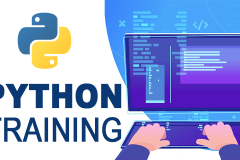Course Overview:
In Mastering Python 3: Part 3 - Dictionaries, Sets, & JSON, you'll gain a comprehensive understanding of some of the most powerful and versatile data structures in Python. This course is designed to enhance your knowledge of dictionaries, sets, and JSON, along with the underlying concepts that make them work efficiently. You’ll explore the following key topics:
-
Associative Arrays:
Learn about associative arrays, the foundation of dictionaries in Python, and how they allow for efficient data retrieval using key-value pairs. -
Hash Tables and Hash Functions:
Understand the mechanics of hash tables and hash functions, which power dictionaries and sets, ensuring quick data access and storage. -
Python's Implementation of Hash Tables:
Dive into Python's specific implementation of hash tables, and see how it optimizes performance for dictionaries and sets. -
Dictionaries and Sets:
Master the use of Python dictionaries and sets, two essential data structures for storing and managing collections of data. -
Defining Hash Functions for Custom Classes:
Learn how to define hash functions for your custom classes, making them compatible with Python's dictionaries and sets, and why this is a powerful technique. -
Creating Customized Dictionaries Using the UserDict Class:
Explore how to create customized dictionaries by subclassing the UserDict class, allowing you to extend and modify dictionary behavior. -
defaultdict:
Understand thedefaultdictfrom Python’s collections module, which simplifies handling missing keys by providing default values automatically. -
OrderedDict and Python 3.6+ Equivalences:
Delve into theOrderedDictand how Python 3.6+ dictionaries maintain insertion order, providing new possibilities for ordered data management. -
Counter (Multi-Sets):
Discover theCounterclass, a specialized dictionary subclass for counting hashable objects, often used in frequency analysis and other applications. -
ChainMap:
Learn aboutChainMap, a powerful tool for managing multiple dictionaries as a single unit, useful for complex configuration management. -
Serialization and Deserialization:
Explore the concepts of serialization and deserialization, and how they are used to convert Python objects to and from various data formats. -
JSON Serialization/Deserialization:
Master JSON serialization and deserialization in Python, a critical skill for working with web APIs, configuration files, and data interchange. -
Introduction to JSONSchema, Marshmallow, PyYAML, and Serpy:
Get introduced to third-party libraries like JSONSchema, Marshmallow, PyYAML, and Serpy, which provide powerful tools for data validation, serialization, and configuration management.





